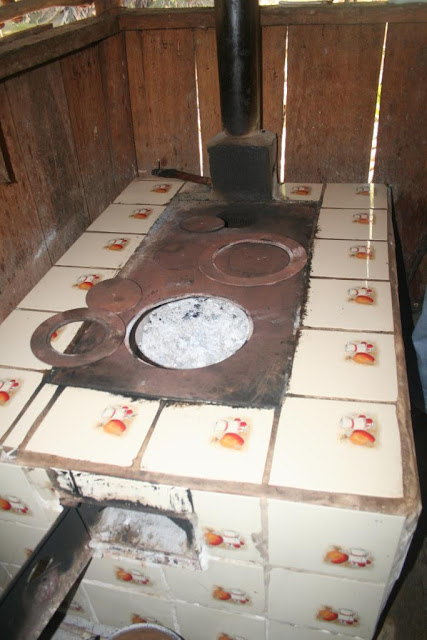 |
| Alvin giving the lay of the land after a boat ride up the Sarstoon River. |
Alvin explains that he first heard of EcoLogic about 10 years ago when he served as a board member to EcoLogic’s partner in Belize, the Sarstoon Temash Institute for Indigenous Management (SATIIM). He accompanied EcoLogic on a learning exchange to Honduras to see projects we were implementing, including the installation of fuel-efficient stoves, and learn directly from community participants in the area. Alvin said when he first walked into the home of family with an EcoLogic stove he was blown away by how clean the inside of the kitchen was, which he described as “white”. In a region where, dirt floors and open-pit fires are the norm he could not believe his eyes.
“I was like, wow, where do you people cook? The pots were shining and I wondered where the smoke was and then I said to myself: the people of Barranco need something like that, too. Since that trip to Honduras, it has always been my dream to get the stoves to Barranco and Belize so that people can see that there are techniques to help us live a little longer.”
So, almost 10 years later when EcoLogic called for his help, Alvin jumped at the chance.
.jpg) |
| Alvin presenting at a press conference to denounce oil exploration in the Sarstoon Temash National Park. |
Alvin was raised and lives in a fishing village on the coast of Belize called Barranco. The population here is roughly 160 inhabitants and it is the coastal gateway to the Sarstoon Temash National Park which is threatened by oil exploration and drilling. Full-time employment is hard to come by in this remote coastal village, but Alvin gets by. He supports his family of three daughters and one boy, through daily labor and fishing the coastal waters. “I know them [the communities] from my heart and would be willing to assist them however I can,” said Alvin.
Installing the fuel-efficient stoves took Alvin about one month. First, he would visit each family in the evening to make plans for the following day’s labor building stoves.
“At around 6 in the morning I would wake, share a cup of good, strong coffee with the stove technician and then go to the first home.” They would then assess the levelness of the area where the stove was to be installed. The “family helper” would begin mixing the sand and cement for laying the blocks and wait for it to set. At that point they would go to the next house to set the foundation. At about midday Alvin would return to the first house to fill the area with mud and red clay, soak the bricks, stomp it down, and make another mix of clay to fill the hole. After that the team would place the outer bricks and plaster the outside to make the stove smooth. This stove design uses about 90 bricks and takes a full day’s work.
“The women could hardly wait to use it, but we told them they must wait 40 days for the bricks to cure. If they use the stove before that, the bricks will crack.”
 |
| Here is a recently installed stove in Belize, much like the ones Alvin was helping construct. |
Alvin expressed his heartfelt thanks for the work EcoLogic has started in the area he also said it is his hope that it will continue. “There are many more stoves that these communities need. We need to spread the love to as many families as we can.”
Alvin’s island-style charisma, loyalty, and love for his land have made him a leader in his community. He fishes where his grandfather fished, he farms where his grandfather farmed and he does his best to protect the natural resources that the people of Barranco and the next generation depend on.
- Gina Rindfleisch, Program Officer for EcoLogic
Gina manages EcoLogic's fundraising activities targeting individual donations. Prior to joining EcoLogic she served for two years as a Peace Corps volunteer in Nicaragua working in environmental education and holds a BA in environmental studies from Long Island University.




